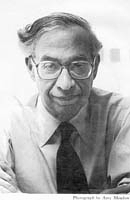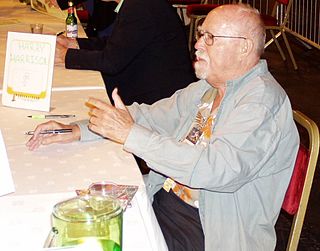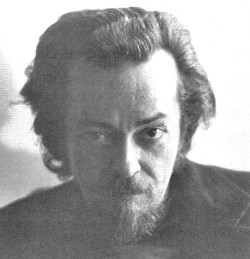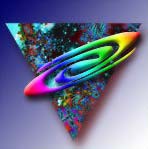Related Research Articles

Donald Allen Wollheim was an American science fiction editor, publisher, writer, and fan. As an author, he published under his own name as well as under pseudonyms, including David Grinnell.

Fritz Reuter Leiber Jr. was an American writer of fantasy, horror, and science fiction. He was also a poet, actor in theater and films, playwright, and chess expert. With writers such as Robert E. Howard and Michael Moorcock, Leiber is one of the fathers of and coined the term sword and sorcery.

Michael John Moorcock is an English writer, primarily of science fiction and fantasy, who has also published literary novels. He is also a successful musician. He is best known for his novels about the character Elric of Melniboné, a seminal influence on the field of fantasy since the 1960s and '70s.

Gene Rodman Wolfe was an American science fiction and fantasy writer. He was noted for his dense, allusive prose as well as the strong influence of his Catholic faith. He was a prolific short story writer and novelist, and won many literary awards. Wolfe has been called "the Melville of science fiction", and was honored as a Grand Master by the Science Fiction and Fantasy Writers of America.

Gardner Raymond Dozois was an American science fiction author and editor. He was the founding editor of The Year's Best Science Fiction anthologies (1984–2018) and was editor of Asimov's Science Fiction magazine (1984–2004), garnering multiple Hugo and Locus Awards for those works almost every year. He also won the Nebula Award for Best Short Story twice. He was inducted to the Science Fiction Hall of Fame on June 25, 2011.

Harry Max Harrison was an American science fiction author, known mostly for his character The Stainless Steel Rat and for his novel Make Room! Make Room! (1966). The latter was the rough basis for the motion picture Soylent Green (1973). Long resident in both Ireland and the United Kingdom, Harrison was involved in the foundation of the Irish Science Fiction Association, and was, with Brian Aldiss, co-president of the Birmingham Science Fiction Group.

James Edwin Gunn was an American science fiction writer, editor, scholar, and anthologist. His work as an editor of anthologies includes the six-volume Road to Science Fiction series. He won the Hugo Award for "Best Related Work" in 1983 and he won or was nominated for several other awards for his non-fiction works in the field of science fiction studies. The Science Fiction and Fantasy Writers of America made him its 24th Grand Master in 2007, and he was inducted by the Science Fiction and Fantasy Hall of Fame in 2015. His novel The Immortals was adapted into a 1970–71 TV series starring Christopher George.

Linwood Vrooman Carter was an American author of science fiction and fantasy, as well as an editor, poet and critic. He usually wrote as Lin Carter; known pseudonyms include H. P. Lowcraft and Grail Undwin. He is best known for his work in the 1970s as editor of the Ballantine Adult Fantasy series, which introduced readers to many overlooked classics of the fantasy genre.

Kate Wilhelm was an American author. She wrote novels and stories in the science fiction, mystery, and suspense genres, including the Hugo Award–winning Where Late the Sweet Birds Sang, and she established the Clarion Workshop with her husband Damon Knight and writer Robin Scott Wilson.

Peter Soyer Beagle is an American novelist and screenwriter, especially of fantasy fiction. His best-known work is The Last Unicorn (1968), a fantasy novel he wrote in his twenties, which Locus subscribers voted the number five "All-Time Best Fantasy Novel" in 1987. During the last twenty-five years he has won several literary awards, including a World Fantasy Award for Life Achievement in 2011. He was named Damon Knight Memorial Grand Master by SFWA in 2018.

Michael Whelan is an American artist of imaginative realism. For more than 30 years, he worked as an illustrator, specializing in science fiction and fantasy cover art. Since the mid-1990s, he has pursued a fine art career, selling non-commissioned paintings through galleries in the United States and through his website.
Eurocon is an annual science fiction convention held in Europe. The organising committee of each Eurocon is selected by vote of the participants of the previous event. The procedure is coordinated by the European Science Fiction Society. The first Eurocon was held in Trieste, Italy, in 1972. Unlike Worldcons, Eurocon is usually a title attached to an existing convention. The European SF Awards are given in most of the conventions giving recognition to the best works and achievements in science fiction.

John Brian Francis "Jack" Gaughan, pronounced like 'gone' was an American science fiction artist and illustrator who won the Hugo Award several times. Working primarily with Donald A. Wollheim at Ace Books, and DAW Books from 1971, his simple linear style brought to life images of such works as Andre Norton's Witch World novels and E. E. Smith's Lensmen and Skylark novels. His broad visual vocabulary enabled him to render the objects, spaceships and scenes in whatever was presented to him as they were described in the books and stories he illustrated. That was especially an accomplishment as many of these authors drew on their knowledge of esoteric subjects for their imagery. This ability made him very popular among people with an engineering background.

The Gaylactic Spectrum Awards are given to works of science fiction, fantasy and horror that explore LGBT topics in a positive way. Established in 1998, the awards were initially presented by the Gaylactic Network, with awards first awarded in 1999. In 2002 the awards were given their own organization, the Gaylactic Spectrum Awards Foundation.

Ellen Datlow is an American science fiction, fantasy, and horror editor and anthologist. She is a winner of the World Fantasy Award and the Bram Stoker Award.

The Collected Short Fiction of C. J. Cherryh is a collection of science fiction and fantasy short stories, novelettes and novella written by American author C. J. Cherryh between 1977 and 2004. It was first published by DAW Books in 2004. This collection includes the contents of two previous Cherryh collections, Sunfall (1981) and Visible Light (1986), all of the stories from Glass and Amber (1987), stories originally published in other collections and magazines, and one story written specifically for this collection ("MasKs"). Cherryh's 1978 Hugo Award winning story, "Cassandra" is also included.
The 36th World Science Fiction Convention (Worldcon), also known as IguanaCon II, was held August 30–September 4, 1978, at the Hyatt Regency Phoenix, Adams House, Phoenix Convention Center, and Phoenix Symphony Hall in Phoenix, Arizona, United States. Despite the name, this was the first "IguanaCon".
Karen Haber is an American science fiction and non-fiction author and editor, as well an art critic and historian. She is the author of nine novels including Star Trek Voyager: Bless the Beasts, and co-author of Science of the X-Men. Other publications include Exploring the Matrix: Visions of the Cyber Present, a collection of essays by leading science fiction writers and artists, and Transitions with Todd Lockwood, a retrospective of the artist's work. In 2001 she edited a Hugo-nominated essay collection celebrating J. R. R. Tolkien, Meditations on Middle-earth. Her short fiction has appeared in Asimov's Science Fiction magazine, the Magazine of Fantasy and Science Fiction, and many anthologies. She reviews art books for Locus magazine and profiles artists for various publications including Realms of Fantasy. With her husband, Robert Silverberg, she co-edited Best Science Fiction of 2001, 2002, and the Best Fantasy of 2001 and 2002 for ibooks and later, co-edited the continuation with Jonathan Strahan.
The Ditmar Award has been awarded annually since 1969 at the Australian National Science Fiction Convention to recognise achievement in Australian science fiction and science fiction fandom. The award is similar to the Hugo Award but on a national rather than international scale.

The 1981 Annual World's Best SF is an anthology of science fiction short stories edited by Donald A. Wollheim and Arthur W. Saha, the tenth volume in a series of nineteen. It was first published in paperback by DAW Books in May 1981, followed by a hardcover edition issued in August of the same year by the same publisher as a selection of the Science Fiction Book Club. For the hardcover edition the original cover art of Michael Mariano was replaced by a new cover painting by John Gampert.
References
- 1 2 Locus Index to SF Awards: About the Balrog Awards. Accessed 26 March 2021.
- ↑ Nemedian Chroniclers, Issue #4, p. 12.